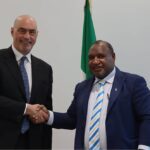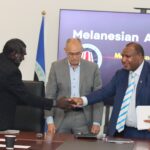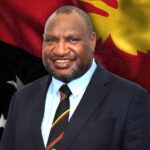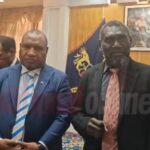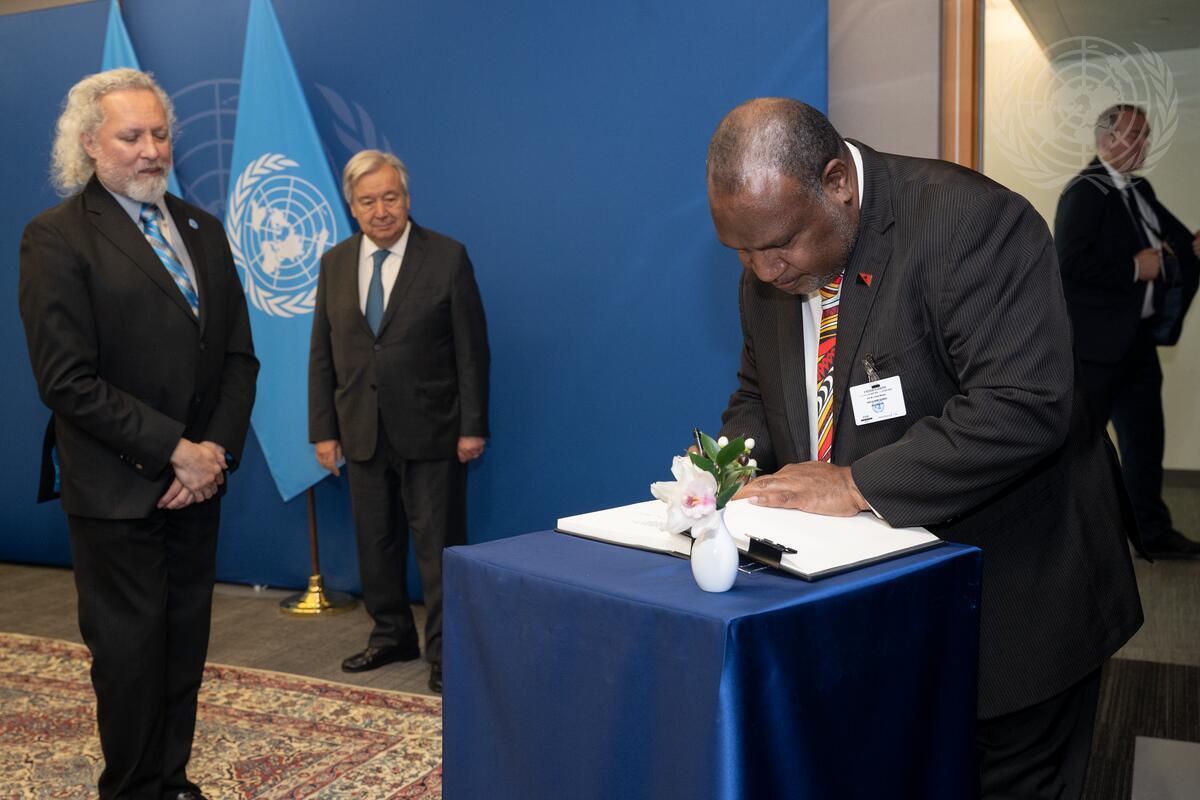Prime Minister Hon. James Marape today delivered Papua New Guinea’s Country Statement at the 79th session of the United Nations General Assembly high-level debate.
Speaking along the session theme of ‘Leaving no one behind: Acting together for the advancement of peace, sustainable development, and human dignity for present and future generations’, the Prime Minister highlighted in the statement three main threats facing humanity – religious intolerance, poverty induced by climate change, and geo-political differences and sovereignty con- tests over territories.
Using Papua New Guinea’s environment and biodiversity, cultures and languages, and work of Christian missionaries in the country as backdrop, the Prime Minister highlighted the protection of individual right to freedom of choice of religion stipulated under the Constitution of PNG, which reflects Article 18 of the United Nations Declaration of Human Rights on Freedom of Thought, Conscience and Religion.
He said, “Papua New Guinea is the world’s most culturally and linguistically di- verse nation, with a myriad of sub-ethnicities and sub-cultures that are still authentically indigenous.
“In terms of environment, my country hosts up to seven percent of the world’s biodiversity most housed within a tropical rainforest that is the third largest in the world, including a vast marine ecosystem. We sustainable manage our forest, land and sea because our livelihood depends on them. In our own way, PNG teaches the world on living in balance with nature, tolerating cultural diversities, and practicing environmental stewardship.”
On poverty, PM Marape highlighted the general global trend of accelerated overharvesting of Earth’s resources which has led to environmental degradation, deforestation, burning of cheap fossil fuel and pollution, leading to cli- mate-induced problems that, in turn, have contributed to poverty increase.
“Ocean nations like mine continue to live with climate change-induced sea- level rise and weather pattern changes which have now become an existential threat.
“PNG’s vast rainforests, rich biodiversity, marine life, and indigenous peoples and cultures are now at the crossroads of great change – either of preservation, or loss and extinction.
“Last month, the Pacific Island Leaders Forum in Tonga, officially recognized these climate change manifestations as existential threats to our Pacific people,” said Prime Minister Marape.
He continued by highlighting the difficulty PNG and island nations of the Pacific face in accessing climate finance and urged that the United Nations look into this matter with urgency, or Papua New Guinea, as a forest nation, would look at “liquidating our forest and marine resources to achieve our development aspirations, including alleviating poverty.”
“It is for this reason, I speak in solidarity with all forest nations, especially those in Congo Basin and Amazon Basin, for adequate compensation if we are to preserve our forests which, in fact, are the lungs of Earth.”
Prime Minister Marape then made an example of French President Emmanuel Macron’s mobilization of European Union funding for the Managalas conservation project, which he pointed out, was the kind of partnership that is needed to save PNG’s forests.
“Again, I remind the world. The forest of PNG is a global asset, and it must be preserved at a price transferable to improve the lives of my forests people. The conservation on climate change mitigation cannot be had without a conversation on forest preservation; they are the two sides to the same coin.
“I call on others out there, especially those with big carbon footprints, to offset these with preservation of our forests,” said PM Marape
On geo-political differences and sovereignty contests, the Prime Minister emphasized the need for better approaches to de-escalate tensions between people and countries.
“Increasing geo-political conflicts and tensions are fueling fragmentation and protectionism around the world. The restrictions on trade, disruptions in supply chains and growing completion are crippling our local economies.
“Violence begets violence, and is evil no matter what the justification might be. Peace must be achieved by peaceful means, no matter how long or unjust it may seem. We live in a time, where, at a press of a button, an atomic or nuclear bomb, will cause irreversible damage to countries and our planet.
“The United Nations role in this must be respected by all nations, for it was for these very reasons that the United Nations was born – so that the world does not face another world war again,” he said, while calling on the UN to make reforms to its Security Council in the removal of its veto power so members could all contribute to decision-making.
“We must do all we can to restore stability to the far reaches of Earth. Globa conflicts cause domino effects, and the subsequent impacts are felt through- out the world with intergenerational wounds,” stated the Prime Minister.
He said PNG had a similar issue in the matter of Bougainville, but had always used negotiations and peaceful means to settle this matter under supervision of United Nations, and called on governments and leaders to view this as a good example.
Prime Minister Marape also highlighted PNG’s efforts at meeting the 17 Sustain- able Goals of the United Nations, guided by early plans such as the Eight Point Plan of the Independence era, and PNG Vision 2050 of 2010 which compels government to develop PNG to the Top 50 nation by 2050 in terms of Human Development Index.
He said PNG had moved from the least developing nation cluster of nations to a lower middle-income category and aiming to enter into a fast development phase within the next two decades, adding that PNG was looking forward to submitting its full progressive report to the United Nations very soon.


